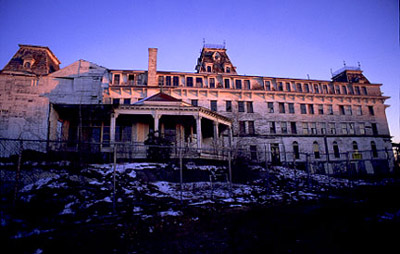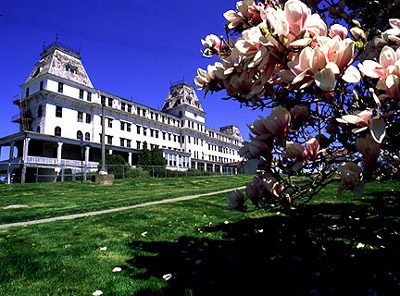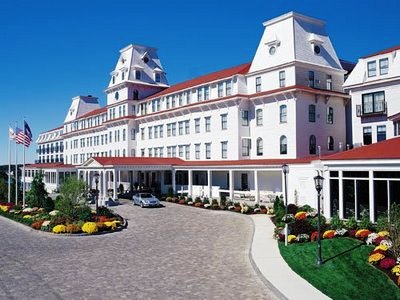The treaty was signed on September 5, 1905 at the Portsmouth Naval Shipyard, situated on Seavey Island in the middle of the Piscatiqua River, between Maine and New Hampshire. It was the first international peace conference to be held in the United States and earned then-President Theodore Roosevelt the 1906 Nobel Peace Prize.
As the country entered a new century, the Treaty of Portsmouth signaled a kind of coming of age for the Republic, a debut on the world stage that would in but a few years see a swirl of events demanding more and more world leadership from Washington. Indeed, it can be argued that the Russo-Japanese War helped ferment tensions in Europe which eventually led to World War I. The domino-effect of events that in turn followed later launched the second World War and the nearly 50 years of East-West tensions known as the Cold War.
In fact great international questions remain to this day, rooted in the nearly forgotten Russo-Japanese conflict -- nearly forgotten maybe by the MTV generation and their hardworking, two income producing parents -- but not lost on the leaders of the two nations involved. To this day, Russia and Japan have not signed a peace treaty ending World War II, partly due to bitterness traced to their bloody 1904-1905 engagement. Nor is this bit of history forgotten by people involved in such organizations as the Japan-America and Russian Societies of New Hampshire, and an organization called the Portsmouth Peace Treaty Forum, which keeps alive the spirit of community interest in global affairs nurtured in Portsmouth in 1905 by locally hosting international meetings of scholars and diplomats.
"What was unique about events surrounding the Treaty of Portsmouth was that the people of the city were the real hosts of the event," says Charles Doleac, an attorney and president of the Treaty Forum and a longtime student of Russo-Japanese relations. Doleac emphasizes that the whole community was behind the event, lending a warm spirit of hospitality and goodwill that certainly added to the peace process and which was also not lost on negotiators from the two nations.
Unlike similar frenetic events of today which involve photo opportunities, daily press conferences, and instantaneous TV coverage - in which the President seems always a dominating presence - the environment surrounding the Portsmouth negotiations were much different. Although the foreign and domestic press was on hand - represented by big city newspapers and such popular periodicals as Harper's Weekly, the pace and tone of the historic meetings, which lasted about 30 days, were methodical and sedate. The commodious Wentworth By-the-Sea Hotel (where both delegations were housed), with its refreshing ocean breezes, long verandahs, and excellent cuisine, added to the relaxing, businesslike pace of the talks, which were held a few miles away at the shipyard, in a brick store house where a museum commemorating the treaty is now located.
So, the dominant outside factor of the peace negotiations in Portsmouth was not the fishbowl effect of instantaneous worldwide press exposure, nor the onsite hovering of a President as micromanager. Rather, it was the gracious role played by the proud but discrete host community itself, a historic city in its own right which pre-dates the American Revolution.
Roosevelt, who originally lobbied to bring the two nations together, never set foot in Portsmouth during the talks, but instead was holed up for the summer at Sagamoe Hill, his estate at Oyster Bay, New York, where he was regularly kept abreast of the meetings via telegraph. In fact, the reason the parlay was not held in Washington was due to the insufferable humidity the Capital City is subject to from June to September, making work there impossible prior to air conditioning. Before World War II, Washington virtually shut down each summer.
Actually, the Portsmouth site won out over a mini-competition between Portland and Bar Harbor, Maine, Newport, Rhode Isalnd, and Atlantic City, New Jeresy. Portsmouth was chosen because of the security and communications resources of the Shipyard, its closeness to Oyster Bay, and because of the community's growing reputation as a desirable tourist area. The Russians had originally wanted to meet in Europe, the Japanese in Asia, but at Roosevelt's invitation, they agreed to meet in the United States.

According to one historian, New Hampshire Governor John McLane and the Executive
Council dispatched an invitation to Roosevelt that June promoting the Granite
State as the best site. Word of the Portsmouth choice was relayed later
that month by Assistant Secretary of State Herbert H.D. Pierce, who would
later remain on the scene throughout the talks as a special liaison to Roosevelt.
Leading the Russian delegation was Sergius Witte, former imperial Minister
of Finance, and veteran diplomat Baron Roman Rosen. Heading the Japanese
delegates were Baron Iutaro Komura, veteran foreign service officer and
1878 graduate of Harvard, and Japan's ambassador to Washington, Kogoro Takashira.
Henry W. Denison of Lancaster, N.H., a veteran U.S. vice consul in Japan
and long-time technical advisor to Japan's foreign office, assisted the
Japanese team.

Main conference room, Portsmouth Naval Shipyard. The conference table was once at RPI (Troy, N.Y.), now it is in Japan as an icon to a great moment in history.
Gov. McLane and the Council welcomed the delegates to Portsmouth at a festive
reception at the old Rockingham County Courthouse on August 8, which included
a parade through the city with many diplomats and other dignitaries attending.
N.H. National Guard and U.S. Marine units acted as honor guards. The formal
talks began on August 10.
The meetings were conducted in four languages (Japanese, Russian, English
and French). Three-hour morning and afternoon sessions were held throughout,
with variations in this schedule as stalemates developed. The delegates
reportedly visited Roosevelt at Oyster Bay on only one occasion each. The
governor and his staff remained at the Wentworth throughout the negotiations,
facilitating an air of helpfulness and hospitality when the delegates were
not in formal meetings.
Following the treaty signing, the Japanese and Russian delegations were
so impressed with this hospitality and of the local people they had met,
each made a cash donation to Governor McLane of $10,000 on behalf of their
governments for charitable purposes, to be determined by McLane.
(When news of the treaty's signing was delivered to Roosevelt by his secretary
William Loeb -- father of the late publisher of the Manchester Union Leader
and N.H. Sunday News of the same name -- the jovial President reportedly
bounded down the stairs of his mansion yelling, "That's bully for the
Russians, the Japanese, and me!")
As it turns out, the Russian and Japanse negotiators thought they were being
hosted by the state of New Hampshire, when in fact the owner of the Wentworth
(the estate of the late Portsmouth beer baron Frank Jones) provided accommodations
free of charge.
McLane in turn -- as an act of goodwill and diplomacy -- invested the gifts
in Japanese and Russian government bonds. A commission was then established
by the state legislature to oversee the investments and disburse the charitable
donations throughout the state. That commission is still in existence. Although
the Russian government defaulted on bond payments following the Bolshevik
Revolution in 1917 (Lenin was not about the honor the Czar's debts), the
Japanese have honored the instruments.
(Note: The Japanese defaulted for nine years during World War II and after,
but issued new bonds in 1951, doubling yearly interest payments for the
following nine years to make up for the lapse. Attempts by the commission
to have the Soviets honor the bonds were not successful during the Cold
War. The current government has not been approached to date, perhaps due
to Russia's tenuous financial standing.)
Today the small museum at the shipyard is the only memorial to the events
that once focused the world's attention on this venerable New England seaport
where Capt. John Paul Jones once lived and built one of the U.S. Navy's
first ships. That, and the decaying shell of the old Wentworth* that looms
like a ghost over-looking the sea -- it's great piazzas long gone as are the
stiff, dignified men in silk hats who here one summer long ago
ended a war in a far off land.


circa 1980's
_______________
*Since this writing, new owners of the long vacant Wentworth
By-the-Sea began a complete restoration. Closed since 1982, the hotel reopened
on May 15, 2003 with 161 delux rooms, including many waterfront suites with
balconies overlooking the water. The original building
was built in 1874. The restored hotel is now the Wentworth-by-the-Sea Marriott Hotel
and Spa. It is truly once again one of New Hampshire's grand hotels.
Access the Wenworth's website here.
_______________
Dean Dexter is a former contributing editor of New Hampshire Magazine, and is a former New Hampshire state representative and Belknap County Commissioner. See Dexter's cover story on the Treaty of Portsmouth in the April, 1997 issue of New Hampshire magazine. An editorial by Dexter on the Wentworth's restoration appeared in the July 29, 1999 of The Union Leader (Manchester, N. H.) and may be viewed at that publication's web archive site at: http://www.theunionleader.com.
Portsmouth (N.H.) Historical Society Website
Bill Paarlberg's rendering of the old Wentworth-by-the-Sea, circa early 1980s

The Wentworth by the Sea Marriot Hotel and Spa, New Castle, New Hampshire, today
Wentworth-by-the-Sea 1950's

Wentworth-by-the-Sea 1800's
Below is a brochure from the 1970's before the 'magic' of gated communities and condos was discovered in the surrounding land...

